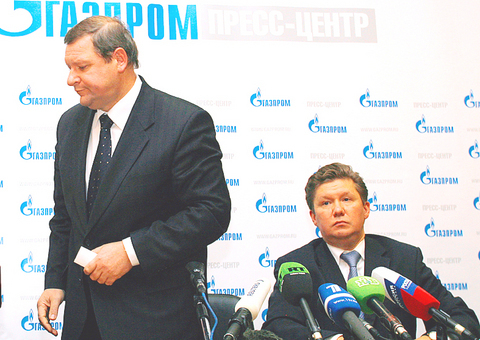Belarus and Russia's natural gas monopoly signed a five-year contract for gas supplies early yesterday, just hours before Russia had threatened to cut off supplies in a price dispute.
Under the agreement, Belarus will pay US$100 per 1,000m3 this year -- a reduction from the US$105 that Gazprom had demanded, according to Gazprom spokesman Sergei Kupriyanov. That is slightly more than double the US$47 Belarus paid last year.
The agreement came after days of increasingly heated discussions that culminated in a session lasting until nearly midnight on Sunday.

PHOTO: AP
"There was a tense atmosphere among the Belarusian delegation since we have agreed to and signed a contract whose conditions for the delivery of gas are not at all favorable," Belarusian Prime Minister Sergei Sidorsky said at a news conference at Gazprom's headquarters.
It was not immediately clear why Gazprom agreed to the lower price for this year. But the contract locks Belarus into agreeing to pay increasing prices over the subsequent four years of the agreement.
The agreement also calls for Gazprom to purchase 50 percent of the shares in Beltransgaz, the Belarusian pipeline network, Kupriyanov said. Gazprom initially had stipulated that Belarus pay US$30 of the new price in Beltransgaz shares, but under the new contract Belarus will pay for all the gas in cash and Gazprom will buy the pipeline shares in cash.
The threatened Russian cutoff had raised concerns in Western Europe about a possible reduction in those countries supplies of Russian gas, much of which reaches Europe through pipelines that cross Belarus.
A similar dispute between Russia and Ukraine early last year resulted in temporary reductions of supplies to Western Europe and raised wide concern about Russia's reliability as an energy partner.
That dispute also brought criticism of Russia for allegedly using its natural resources wealth as a political weapon. But unlike Ukraine, whose president has annoyed the Kremlin by trying to tilt his country Westward, Belarus has had close relations with Russia.
Although the price demanded by Gazprom is well below world market prices for natural gas, it still is likely to be a tough blow to Belarus. The country retains a mostly centralized, Soviet-style economy, and its industries have depended on cheap Russian gas to be competitive.
Subsequent years of the contract are likely to be even tougher. Russia long provided gas to ex-Soviet republics much cheaper than world market prices, but the contract with Belarus locks that country into an obligation to pay gradually increasing prices that will be commensurate with the world market by 2011.
The EU and Germany, which receive some of their Russian gas via Belarus, had urged the neighbors to resolve their dispute quickly and guarantee supplies. Europe is wary of a repeat of the brief supply shortages that ensued when Gazprom halted deliveries to Ukraine during a similar dispute a year ago.

MORE VISITORS: The Tourism Administration said that it is seeing positive prospects in its efforts to expand the tourism market in North America and Europe Taiwan has been ranked as the cheapest place in the world to travel to this year, based on a list recommended by NerdWallet. The San Francisco-based personal finance company said that Taiwan topped the list of 16 nations it chose for budget travelers because US tourists do not need visas and travelers can easily have a good meal for less than US$10. A bus ride in Taipei costs just under US$0.50, while subway rides start at US$0.60, the firm said, adding that public transportation in Taiwan is easy to navigate. The firm also called Taiwan a “food lover’s paradise,” citing inexpensive breakfast stalls

TRADE: A mandatory declaration of origin for manufactured goods bound for the US is to take effect on May 7 to block China from exploiting Taiwan’s trade channels All products manufactured in Taiwan and exported to the US must include a signed declaration of origin starting on May 7, the Bureau of Foreign Trade announced yesterday. US President Donald Trump on April 2 imposed a 32 percent tariff on imports from Taiwan, but one week later announced a 90-day pause on its implementation. However, a universal 10 percent tariff was immediately applied to most imports from around the world. On April 12, the Trump administration further exempted computers, smartphones and semiconductors from the new tariffs. In response, President William Lai’s (賴清德) administration has introduced a series of countermeasures to support affected

CROSS-STRAIT: The vast majority of Taiwanese support maintaining the ‘status quo,’ while concern is rising about Beijing’s influence operations More than eight out of 10 Taiwanese reject Beijing’s “one country, two systems” framework for cross-strait relations, according to a survey released by the Mainland Affairs Council (MAC) on Thursday. The MAC’s latest quarterly survey found that 84.4 percent of respondents opposed Beijing’s “one country, two systems” formula for handling cross-strait relations — a figure consistent with past polling. Over the past three years, opposition to the framework has remained high, ranging from a low of 83.6 percent in April 2023 to a peak of 89.6 percent in April last year. In the most recent poll, 82.5 percent also rejected China’s

PLUGGING HOLES: The amendments would bring the legislation in line with systems found in other countries such as Japan and the US, Legislator Chen Kuan-ting said Democratic Progressive Party (DPP) Legislator Chen Kuan-ting (陳冠廷) has proposed amending national security legislation amid a spate of espionage cases. Potential gaps in security vetting procedures for personnel with access to sensitive information prompted him to propose the amendments, which would introduce changes to Article 14 of the Classified National Security Information Protection Act (國家機密保護法), Chen said yesterday. The proposal, which aims to enhance interagency vetting procedures and reduce the risk of classified information leaks, would establish a comprehensive security clearance system in Taiwan, he said. The amendment would require character and loyalty checks for civil servants and intelligence personnel prior to